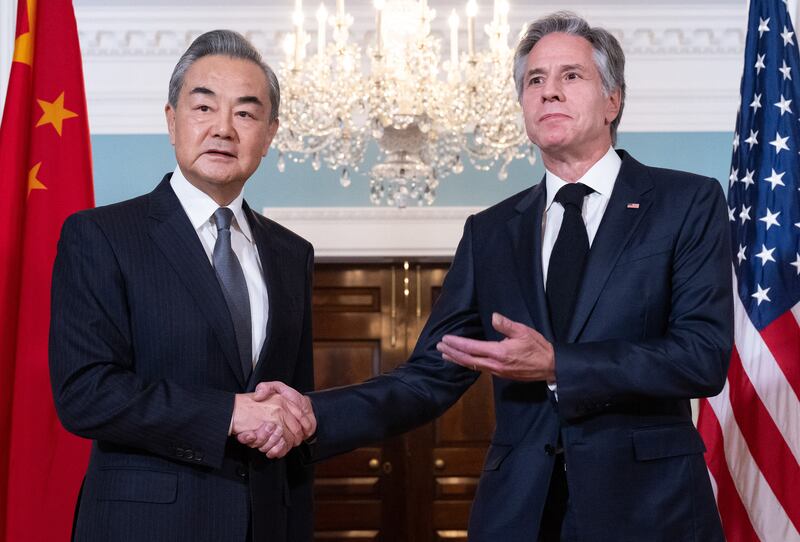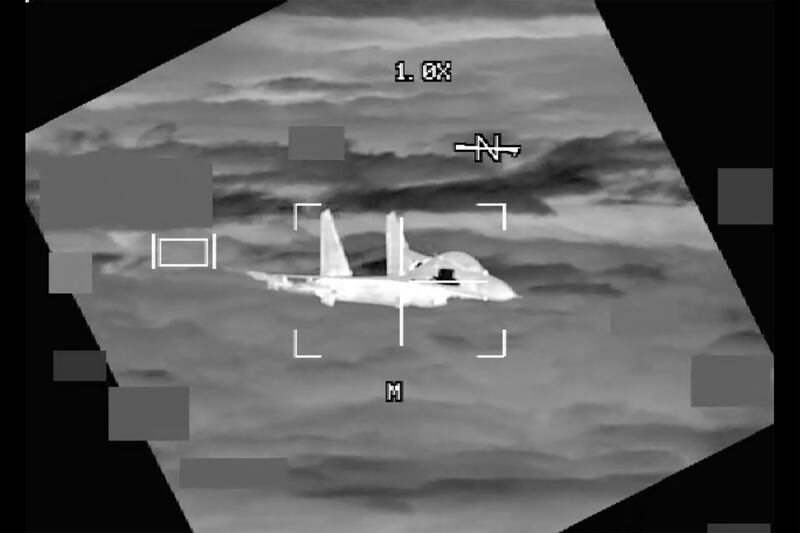UPDATED at 10:06 p.m. EDT on 2023-10-27
A White House official said Friday that preparations were underway for U.S. President Joe Biden to meet his Chinese counterpart, Xi Jinping, in San Francisco next month.
Speaking after Biden met with Chinese Foreign Minister Wang Yi in Washington, the senior administration official, who spoke on the condition of anonymity to comment on the talks, said U.S. officials were “making preparations” for the Xi-Biden meeting next month.
“We’re working together toward such a goal,” the official said, noting that “Chinese leaders often confirm publicly much closer to a trip.”
Earlier, Biden promised during his meeting with Wang to "work together" with Beijing, according to a readout from the White House, and said the world's two powers "need to manage competition in the relationship responsibly and maintain open lines of communication."
John Kirby, a spokesman for the National Security Council, said U.S. Secretary of State Antony Blinken and National Security Adviser Jake Sullivan also attended, and that Sullivan was hosting Wang at Blair House for further talks. Wang is scheduled to depart Saturday.
The meeting between Biden and Xi would take place on the sidelines of the Asia Pacific Economic Cooperation summit in San Francisco from Nov. 12-18. Kirby that no concrete plans were made Friday.
The pair have met only once since Biden took office – last year in Bali – and Xi has not visited America since an April 2017 trip to then-President Donald Trump's Mar-a-Lago resort in Florida.
But Kirby cautioned patience, saying both sides “acknowledge the importance of leader-level channels of communication” and that Biden had repeatedly said he wants to meet soon with Xi.
“When there’s something to confirm, we’ll confirm it,” Kirby said.
Talk it out
Wang arrived in Washington on Thursday evening for his first trip to the United States since before the COVID-19 pandemic, with Blinken welcoming him for a "working dinner" at the State Department.
Wang told reporters before the dinner that it was important for U.S. and Chinese leaders to ignore “jarring voices” in their societies and strive for a “healthy” and “stable” relationship between the two countries.
“We have disagreements, we have differences. At the same time, we also share important common interests, and we face challenges that we need to respond to together,” the Chinese foreign minister said.

Blinken, in even briefer remarks, said he was looking forward to “constructive conversations over the next few days.”
Before Wang's meeting with Biden, the two top diplomats met again for a closed-door meeting on Friday morning, with a State Department readout saying that the pair discussed "a range of issues," including both "areas of difference" and "areas of cooperation."
The readout again emphasized the need for "open lines of communication" with Beijing to "responsibly manage" tense ties, language that the White House has used since the start of the thaw in relations with China in June, when Blinken visited Beijing.
Warmer ties, though, have been criticized by some in Congress.
Republican leaders on the House Foreign Affairs Committee, for instance, have called on the White House to "not fall for false promises" from a government they said had proved "an unreliable partner."
On Friday, the bipartisan Congressional-Executive Commission on China also issued a statement saying that Biden administration officials who meet Wang "must raise the cases of Uyghurs, Hong Kongers, Tibetans and other political prisoners unjustly detained in China."
Asked whether Biden had raised any such concerns during his meeting with Wang, Kirby said that he could not offer any details.
‘Unsafe intercepts’
Wang's trip also comes as the United States released more footage of a near accident between a Chinese fighter-jet and a U.S. B-52 bomber over the South China Sea, which it said occurred on Tuesday and was the latest in more than 180 such incidents since 2021.
A U.S. statement said that the Chinese fighter-jet flew at an “uncontrolled excessive speed, flying below, in front of, and within 10 feet of the B-52, putting both aircraft in danger of a collision.”

Earlier this month, the Pentagon said it believed the goal of such behavior was "to pressure the United States and other nations to reduce or cease lawful operations near areas where Beijing claims territorial sovereignty," such as in the Taiwan Strait and the South China Sea.
Kirby said American officials routinely “raised our concerns about the unsafe intercepts in the South China Sea” in talks with Chinese officials.
In Beijing, Foreign Ministry spokeswoman Mao Ning said that the close encounters were the fault of the U.S. military which, she argued, had no business flying jets over the South China Sea.
“The U.S. military planes traveled thousands of miles to China’s doorstep to flex muscle,” Mao said. “That is the source of maritime and air security risks, and is not conducive to regional peace and stability.”
Radio Free Asia (RFA), a news service affiliated with BenarNews, produced this report. It was updated to add comments from a White House official about a Biden-Xi meeting.
